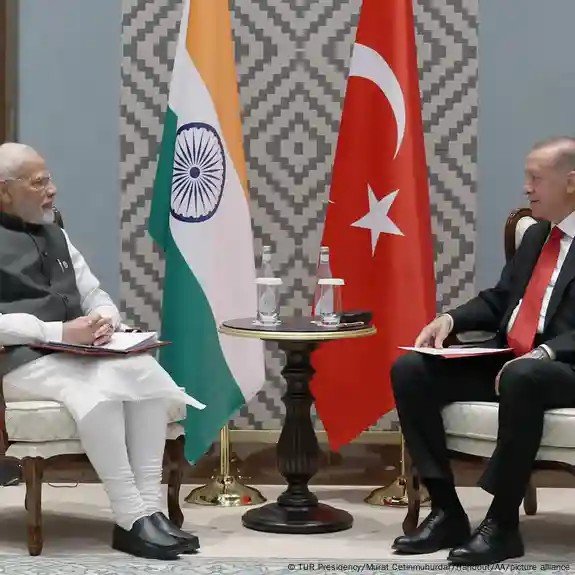Turkey is facing sharp reaction from India over its relations with Pakistan.
This tension stems from the vocal and material support given by Turkey to Pakistan during recent India-Pakistan hostilities, particularly after the Pahalgam terror attack in April 2025, which claimed 26 lives, and the subsequent Operation Sindoor launched by India on May 7, 2025, targeting terror camps in Pakistan and Pakistan-administered Kashmir (PoK). Turkey, along with Azerbaijan, issued statements supporting Pakistan, with Turkish President Recep Tayyip Erdogan advocating a multilateral solution to Kashmir and visiting Pakistan in February 2025 to boost trade and military ties. This perceived bias, especially given India’s assistance to Turkey during the 2023 earthquake, has prompted a response from India.
Diplomatic measures
India's diplomatic actions include postponing the credentials presentation event for Turkish ambassador-designate Ali Murat Ersoy, citing "scheduling issues" amid tensions over Turkey's diplomatic and defence support to Pakistan. Briefing a parliamentary panel on May 19, 2025, Foreign Secretary Vikram Misri said Turkey's stance is "not surprising" given historical patterns and does not indicate a normalisation of relations in the near future, indicating that high-level engagement will remain challenging.
Economic and trade impact
Economic boycotts have been a significant response, with the Confederation of All India Traders (CAIT) announcing a nationwide boycott of trade with Turkey and Azerbaijan, urging a halt to imports, exports and business engagements. Major retailers such as Reliance and Myntra have removed Turkish brands, and Mukesh Ambani's firms have stopped selling Turkish products. Trade figures show India exported $5.2 billion to Turkey from April 2024 to February 2025 and imported $2.84 billion, including major exports such as mineral fuels, electrical machinery, automotive parts, pharmaceuticals, textiles and cotton and imports such as marble, fruits, gold, mineral oil and petroleum. India also ended a $2 billion shipbuilding deal with Anadolu Shipyard, citing local capacity but linking it to Pakistan ties. Previous posts such as India Today have highlighted economic protests launched by Indian traders, including a ban on marble in Udaipur and a 60% drop in travel bookings.
Aviation and security
India revoked the security clearance of Turkish firm Celebi Aviation Services, preventing it from operating at Indian airports due to "national security" concerns, a move that Celebi legally challenged. Air India lobbied to halt IndiGo's leasing deal with Turkish Airlines, citing business and security issues. An excerpt from a CNBCTV18News report states that this protest in the market has led to Celebi shares falling by 10%.
Academic and cultural ties
Universities such as IIT Bombay, Jawaharlal Nehru University (JNU) and Maulana Azad National Urdu University have suspended their ties with Turkish institutions, citing Turkey's stance on Pakistan. The Indian film industry has been urged to avoid shooting in Turkey, further straining cultural exchanges. An article in Livemint discusses the growing protests, which also include severing academic ties.
Tourism and public sentiment
Social media campaigns and political calls to avoid spending in countries that support India's opponents have led to a 60% drop in travel bookings to Turkey, while cancellations have increased by 250%. In 2024, 330,100 Indians will travel to Turkey (up from 274,000 in 2023), but the recent boycott has had a significant impact on this, with travel platforms such as EaseMyTrip, MakeMyTrip and ixigo suspending bookings and halting promotions. Leaders such as Asaduddin Owaisi have criticised Turkey's alliance with Pakistan, emphasising India's historic ties with Turkey and its 200 million Muslim population. As seen in an earlier post by sansadflix, trends such as #BoycottTurkey on social media reflect people's anger, which has been further fuelled by Pakistan's use of Turkish drones against India.
